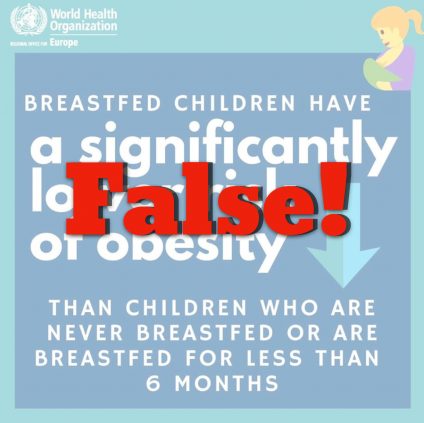
If I had to guess, I would say that the folks at the World Health Organization are afraid.
They’re afraid that if women in industrialized countries knew the truth about how trivial the benefits of breastfeeding really are, they might not feel pressured to breastfeed. I don’t know why that would be a bad thing — since the benefits truly are trivial and have no measurable impact on infant health — but they seem to think it is.
[pullquote align=”right” cite=”” link=”” color=”” class=”” size=””]The WHO admits that their own data do NOT justify causal inference … then proceeds to draw a causal inference.[/pullquote]
Hence this latest effort to mislead women by claiming again — falsely — that breastfeeding prevents obesity.
They even made a meme! Too bad it isn’t true.

A 2018 comprehensive review of the breastfeeding literature had this to say about breastfeeding and obesity:
The relationship between breastfeeding and obesity later in life is debatable. A large, systematic 2014 review of 15 cohort and 10 cross-sectional studies found a significantly reduced risk of childhood obesity among children who were breastfed (adjusted OR=0.78; 95% CI, 0.74- 0.81). However, the review included studies that controlled for different confounders, and smaller effects were found in studies in which more confounders were taken into account.
The 2013 WHO meta-analysis found a small (approximately 10%) reduction in the prevalence of overweight or obese children, but cautioned that residual confounding and publication bias were likely. At 6.5 and 11.5 years of follow-up, PROBIT failed to demonstrate a protective effect for exclusively or “ever” breastfed infants. Sibling analysis similarly fails to demonstrate a statistically significant relationship.
A 2015 meta-analysis of 23 high-quality studies with a sample size >1500 children and controlled for important confounders showed a pooled reduction in the prevalence of overweight or obesity of 13% (95% CI, 6-19).57 The protection in this meta-analysis showed a dilution of the effect as the participants aged and an inverse relationship of the effect with sample size.
Breastfeeding is, therefore, unlikely to play a significant, if any, role in combating the obesity epidemic. (my emphasis)
But the WHO itself has published a new paper that found … the same thing that is already known about breastfeeding and obesity: the link is tenuous to non-existent.
The pooled analysis showed that, compared to children who were breastfed for at least 6 months, the odds of being obese were higher among children never breastfed or breastfed for a shorter period, both in case of general (adjusted odds ratio [adjOR] [95% CI] 1.22 [1.16–1.28] and 1.12 [1.07–1.16], respectively) and exclusive breastfeeding (adjOR [95% CI] 1.25 [1.17–1.36] and 1.05 [0.99–1.12], respectively).
There are three major problems with this paper:
1. The authors didn’t correct for the most important confounding variable, maternal BMI.
2. Even if the results don’t disappear when adjusted for confounding, they are so small as to be clinically meaningless.
3. Correlation does not prove causation.
The authors themselves acknowledge that they haven’t adjusted for all relevant confounders.
…[T]here was no information about the maternal BMI at the time of her child’s birth, which has been shown to be amongst the determinants of birth outcomes and childhood overweight, reflecting the contributions of shared genes and the environment.
So the results themselves could be illusory and might very well disappear if maternal BMI — a known determinant of childhood weight — were taken into account.
But even if the link between breastfeeding and obesity didn’t disappear, its effect is so small as to be meaningless.
Several years ago Gary Taubes wrote a piece for the New York Times Magazine explaining how lay people can judge the results of epidemiological studies, Do We Really Know What Makes Us Healthy?.
…[H]ow should we respond the next time we’re asked to believe that an association implies a cause and effect, that some medication or some facet of our diet or lifestyle is either killing us or making us healthier?
He answers:
If the association appears consistently in study after study, population after population, but is small — in the range of tens of percent — then doubt it. For the individual, such small associations, even if real, will have only minor effects or no effect on overall health or risk of disease…
In this study, as in multiple previous studies, the association is small, in the range of tens of percent. And that means it isn’t clinically relevant, having only minor effects or no effect on overall health or risk of disease.
The WHO claims about this study aren’t merely misleading, though, they are outright lies.
The authors themselves acknowledge that they have NOT proved that breastfeeding reduces the risk of obesity:
…[T]he data come from cross-sectional studies, which can detect an association between exposure and outcome but do not justify causal inference.
It’s hard to be clearer than that. They admit that their own data DO NOT justify causal inference … and then proceed to IGNORE what they just admitted.
The present work confirms the beneficial effect of breastfeeding with regard to the odds of becoming obese…
It doesn’t and it can’t because the data DO NOT justify causal inference!
Why would the WHO mislead the public about what their research on breastfeeding and obesity actually shows?
Here’s a clue in an interview with one of the researchers:
World Health Organisation (WHO) experts who led the Europe-wide research are calling for more help and encouragement to women to breastfeed, as well as curbs on the marketing of formula milk which, said senior author Dr João Breda, misled women into thinking breast was not necessarily better.
But breastfeeding ISN’T necessarily better, the actual benefits is industrialized countries are trivial, and there are very real risks to breastfeeding promotion — measured in tens of thousands of newborn hospital readmissions per year.
No amount of misleading claims from the WHO and its researchers changes the fact that breast is NOT best for every mother and every baby!

